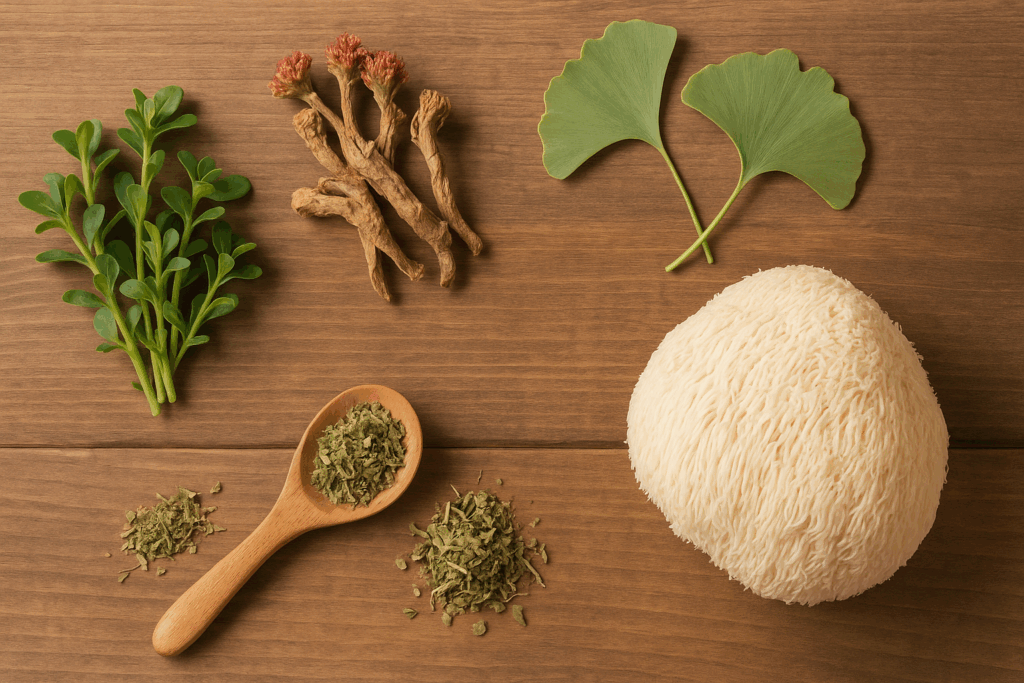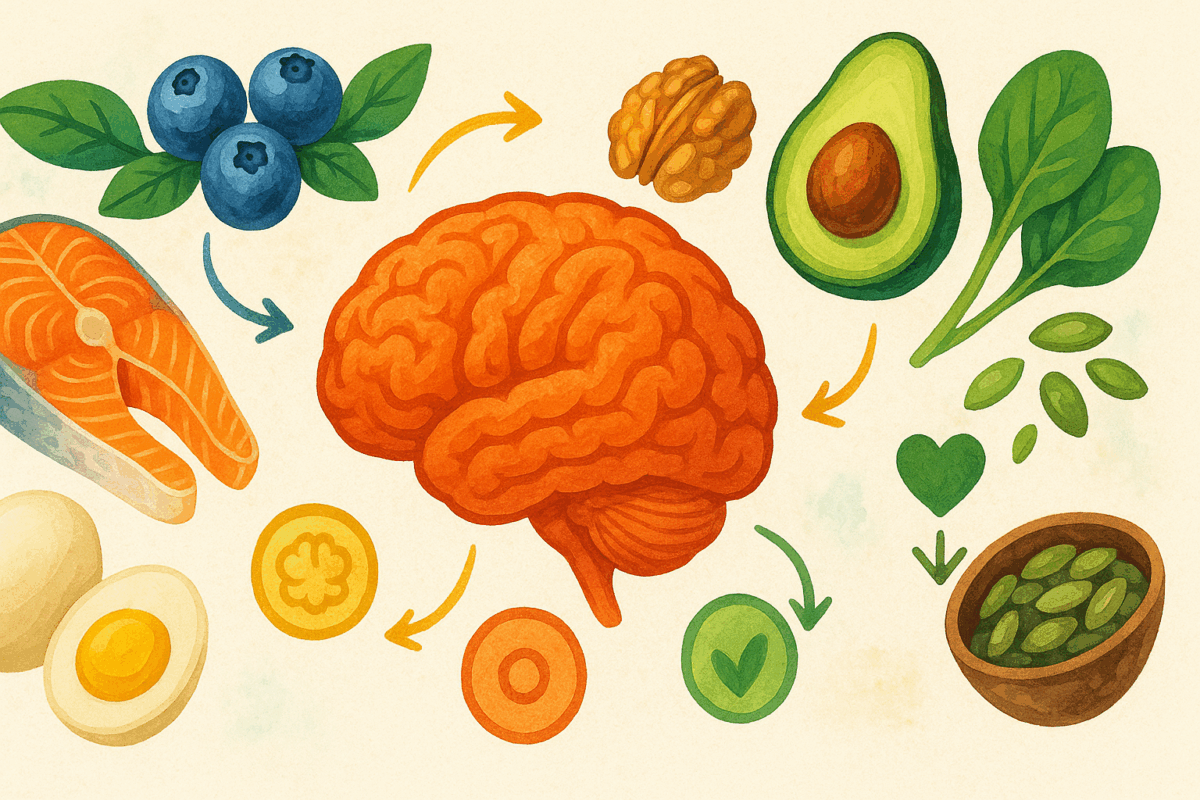Introduction: Exploring Natural Solutions for ADHD Support
Attention Deficit Hyperactivity Disorder (ADHD) is a complex neurodevelopmental condition affecting millions worldwide, and an increasing number of women are seeking alternative, natural approaches to support cognitive balance, emotional well-being, and focus. While conventional medications remain a cornerstone of treatment for many, interest in herbal remedies is flourishing, driven by a desire for holistic options with fewer side effects. For women navigating the unique manifestations of ADHD, which often include inattentiveness, emotional dysregulation, and heightened stress, herbal support can offer meaningful benefits. In this comprehensive guide, we explore the best herbs for ADHD support, with a special focus on how natural remedies may help women boost focus and achieve calmness. Along the way, we integrate essential insights on foods to boost memory, how to improve memory, and brain-boosting foods that promote cognitive health.
You may also like: Where to Find the Best Alpha Brain Pouches Near You: Exploring Alpha Nootropic Pouches for Focus and Mental Clarity
Understanding ADHD in Women: Unique Challenges and Needs
ADHD presents differently in women compared to men. Many women experience more internalized symptoms, such as daydreaming, forgetfulness, and emotional sensitivity, rather than hyperactivity. These subtler symptoms can lead to underdiagnosis and undertreatment. Cognitive challenges like difficulties in concentration, memory lapses, and executive dysfunction often disrupt daily life, professional achievements, and emotional health. Understanding these gender-specific nuances is critical when considering natural remedies. Tailored support, including the strategic use of brain-boosting foods and herbs that foster calm and cognitive clarity, becomes invaluable.
For women seeking ways to improve memory and concentration naturally, herbs represent one avenue among a broader toolkit. Good foods for brain health, foods that help with memory, and lifestyle practices complement herbal support, creating a synergistic approach to better living. Addressing how to increase memorization and strengthen short-term memory involves not only herbal interventions but also mindful attention to diet, exercise, and stress management.

Top Herbs for ADHD Support: Natural Allies for Focus and Calm
Herbs have long been used in traditional medicine systems to enhance cognitive function, emotional balance, and nervous system resilience. Scientific research increasingly supports the benefits of specific botanicals for ADHD symptoms. Below, we explore some of the best herbs known to support focus, calmness, and brain health, especially for women managing ADHD.
Bacopa Monnieri: The Memory Enhancer
Bacopa Monnieri, often referred to as Brahmi, is a revered herb in Ayurvedic medicine traditionally used to enhance cognitive function. Modern research suggests that Bacopa can significantly improve memory recall, attention span, and information processing speed. For women with ADHD, Bacopa offers dual benefits: cognitive enhancement and stress reduction.
Rich in bacosides, the active compounds responsible for its neuroprotective effects, Bacopa supports the production of key neurotransmitters involved in learning and memory. Regular use of Bacopa has been linked to improvements in how to strengthen memory and how to improve short-term memory, making it a cornerstone herb for those aiming to boost focus naturally.
Incorporating Bacopa into a comprehensive wellness strategy that includes brain improvement foods and brain foods list staples, such as blueberries, walnuts, and leafy greens, creates a robust foundation for cognitive health. Studies suggest that combining Bacopa supplementation with foods good for the brain can amplify cognitive benefits.

Rhodiola Rosea: The Adaptogen for Emotional Balance
Rhodiola Rosea, a powerful adaptogen, has gained popularity for its ability to enhance resilience to stress, improve mental clarity, and stabilize mood. For women with ADHD, where emotional dysregulation can be a prominent challenge, Rhodiola serves as an invaluable ally.
By modulating cortisol levels and supporting mitochondrial energy production, Rhodiola fosters sustained attention and emotional steadiness. Its ability to enhance cognitive flexibility makes it a natural candidate for those seeking ways to improve memory recall and sharpen cognitive performance.
Paired with a diet rich in brain boosting foods like fatty fish, avocados, and pumpkin seeds, Rhodiola can bolster both emotional and cognitive well-being. For those exploring how to get better memory through natural means, incorporating Rhodiola alongside a brain-boosting foods regimen proves especially effective.

Ginkgo Biloba: The Circulatory Stimulator
Ginkgo Biloba is one of the most researched herbal remedies for cognitive support. By enhancing blood flow to the brain and providing antioxidant protection, Ginkgo supports memory, focus, and overall brain function.
For women with ADHD, Ginkgo’s ability to promote better memory retention and reduce cognitive fatigue makes it a standout choice. Regular use has been associated with improvements in how to sharpen your memory and how to improve memory and concentration.
Integrating Ginkgo supplementation with the best foods for brain health, such as eggs, dark chocolate, and green tea, creates a potent synergy for cognitive vitality. Ginkgo is particularly beneficial for those wondering how to increase memory power and maintain mental clarity throughout demanding days.

Gotu Kola: The Calming Clarifier
Gotu Kola, another Ayurvedic gem, has long been prized for its calming and cognitive-enhancing effects. It supports neurotransmitter function, promotes healthy blood circulation, and exerts mild anxiolytic (anxiety-reducing) effects.
For women with ADHD who experience heightened anxiety and emotional turbulence, Gotu Kola offers gentle, sustainable support. Its ability to promote mental clarity and focus makes it an excellent addition for those striving for better memory retention and cognitive endurance.
Pairing Gotu Kola with a diet abundant in foods that improve memory, such as berries, spinach, and almonds, ensures a steady supply of brain-supportive nutrients. This holistic approach strengthens the foundation for memory enhancement and emotional resilience.
Lion’s Mane Mushroom: The Neurogenesis Promoter
Lion’s Mane Mushroom stands out for its remarkable ability to promote neurogenesis — the growth of new neurons. Containing bioactive compounds such as hericenones and erinacines, Lion’s Mane stimulates nerve growth factor (NGF) production, essential for maintaining healthy brain cells.
Women seeking ways to improve memory and cognitive flexibility will find Lion’s Mane particularly appealing. It not only enhances memory recall but also supports emotional balance by modulating inflammatory pathways linked to mood disorders.
For maximum benefits, Lion’s Mane can be combined with brain foods like turmeric, pomegranates, and broccoli, further amplifying brain health and emotional well-being. Those exploring how to strengthen short-term memory or seeking foods good for the brain should seriously consider Lion’s Mane as a daily supplement.

Frequently Asked Questions (FAQ)
1. How can sleep quality impact your ability to improve memory and concentration?
Quality sleep is one of the most underrated factors when considering how to improve memory and concentration. During deep sleep stages, the brain consolidates memories, integrating new information learned throughout the day. Poor sleep can disrupt this process, making it harder to sharpen your memory or to maintain focus. In fact, pairing consistent sleep habits with eating brain boosting foods like walnuts, blueberries, and leafy greens can significantly enhance memory retention. Sleep acts as a foundation for other strategies like consuming foods that help with memory or practicing recall exercises.
2. Are there any daily habits beyond food that significantly boost memory strength?
Absolutely. While consuming brain foods lists of nutritious items is important, daily mental habits like journaling, learning a new language, or engaging in complex problem-solving games are critical ways to improve memory. These habits stimulate neuroplasticity, helping you gain memory over time. Mindful meditation has also shown promising results in clinical studies when combined with food for brain health strategies. Essentially, pairing mental exercise with foods that improve memory builds a more resilient and adaptable brain over the long term.
3. How do social interactions influence short-term and long-term memory?
Social engagement stimulates parts of the brain associated with memory formation and retrieval. Participating in group discussions or collaborative projects is a powerful method for how to strengthen short term memory. Studies show that social learners often perform better on memory tests, possibly because conversation requires real-time recall and processing. Eating good foods for brain health like avocados and salmon before social events may even enhance cognitive agility. Thus, creating strong social bonds complements dietary choices like the best foods for brain health when looking to get better memory.
4. Which overlooked foods dramatically enhance memory but aren’t commonly listed?
While classic brain boosting foods like berries and fish are well-known, underrated options include beets, pumpkin seeds, and fermented foods. These selections not only support gut health but also offer surprising benefits for brain health, thanks to their anti-inflammatory properties. Adding these hidden gems to your brain foods list is a secret weapon if you’re serious about how to increase memorization naturally. Diversifying your diet with these less common foods for memory can yield better cognitive results than focusing solely on typical “superfoods.”
5. How do hydration habits influence memory performance?
Hydration is a critical, often ignored element when discussing ways to improve memory. Dehydration, even mild, can impair focus, reaction time, and working memory. In addition to drinking water, including what drinks help with memory loss like green tea or pomegranate juice can fortify cognitive performance. These beverages complement foods good for the brain and should be integrated into a broader brain-health routine. Combining hydration strategies with the best foods for brain health makes a measurable difference in how to sharpen your memory.
6. How can intermittent fasting impact memory and brain health?
Emerging studies suggest that intermittent fasting may help stimulate brain-derived neurotrophic factor (BDNF), a protein linked to learning and memory. When done cautiously and paired with brain improvement food like leafy greens, nuts, and oily fish, fasting can enhance neurogenesis—the creation of new neurons. If you’re wondering how to strengthen memory, intermittent fasting combined with foods good for brain and memory like almonds and walnuts may offer synergistic benefits. However, it’s vital to break fasts with foods that help with memory rather than processed meals for optimal results.
7. Are there cereals specifically good for memory enhancement?
Yes, and the choice of cereal matters significantly. The best cereals for memory are those rich in whole grains, fiber, and fortified with B vitamins like folate. Look for varieties with minimal added sugars but packed with brain-supportive ingredients like flaxseeds or chia. Such cereals, when consumed alongside brain foods list items like berries or nuts, can supercharge morning cognition. Incorporating these cereals into breakfast routines is a simple yet powerful approach to get good memory without radical diet changes.
8. What role does emotional health play in memory formation?
Emotions have a profound impact on memory encoding. Positive emotional states, such as excitement or gratitude, make it easier to improve memory recall later on. Conversely, chronic stress or anxiety can erode both short- and long-term memory. Strengthening emotional resilience through gratitude practices while maintaining a diet full of foods that improve memory provides a dual path toward mental clarity. Thus, mastering emotional regulation is equally important as choosing brain boosting foods when exploring how to get better memory.
9. Which nuts are especially good for brain and memory health?
Among various options, walnuts and almonds stand out when evaluating which nuts are good for brain and memory. Walnuts, rich in DHA, a type of Omega-3 fatty acid, directly support neuronal membrane function. Almonds provide essential B vitamins and magnesium, which are crucial for brain health and ways to improve memory. Integrating these nuts into your daily diet alongside other foods that help with memory can dramatically impact both how to sharpen your memory and increase learning capacity over time.
10. How can you measure improvement when working on memory enhancement strategies?
Tracking memory improvements requires intentional measurement, not just casual observation. Cognitive tracking apps, journaling daily recall abilities, or self-testing newly learned information are practical tools for assessing how to improve short term memory. Additionally, dietary consistency with brain improvement food like leafy greens and fatty fish should be noted alongside mental performance trends. Evaluating the effects of different foods good for the brain and memory-enhancing strategies over a 90-day period provides concrete insights into how to get good memory. Long-term commitment and structured tracking yield the best understanding of personal cognitive evolution.

The Role of Diet: Brain-Boosting Foods for ADHD Management
While herbs form a powerful cornerstone, diet plays an equally pivotal role in optimizing cognitive health. Integrating the right foods for memory enhancement into daily meals ensures that the brain receives the essential nutrients required for peak function.
Omega-3 fatty acids, found abundantly in salmon, mackerel, and walnuts, are critical for neuronal membrane integrity and neurotransmission. For women exploring how to improve memory and concentration, prioritizing these brain improvement foods is essential. Similarly, antioxidant-rich foods like blueberries and spinach combat oxidative stress, preserving cognitive vitality.
When thinking about how to get good memory, it is crucial to consume a varied brain foods list that includes sources of choline (such as eggs and soybeans), magnesium (found in leafy greens and nuts), and flavonoids (present in berries and citrus fruits). These nutrients support neurotransmitter synthesis, neuroplasticity, and cerebral blood flow.
Incorporating good foods for brain health is not only about boosting cognition but also about sustaining energy, balancing mood, and reducing inflammation — all factors relevant to managing ADHD naturally. Foods that help with memory, such as avocados, broccoli, and pumpkin seeds, are particularly beneficial for women facing cognitive challenges.


